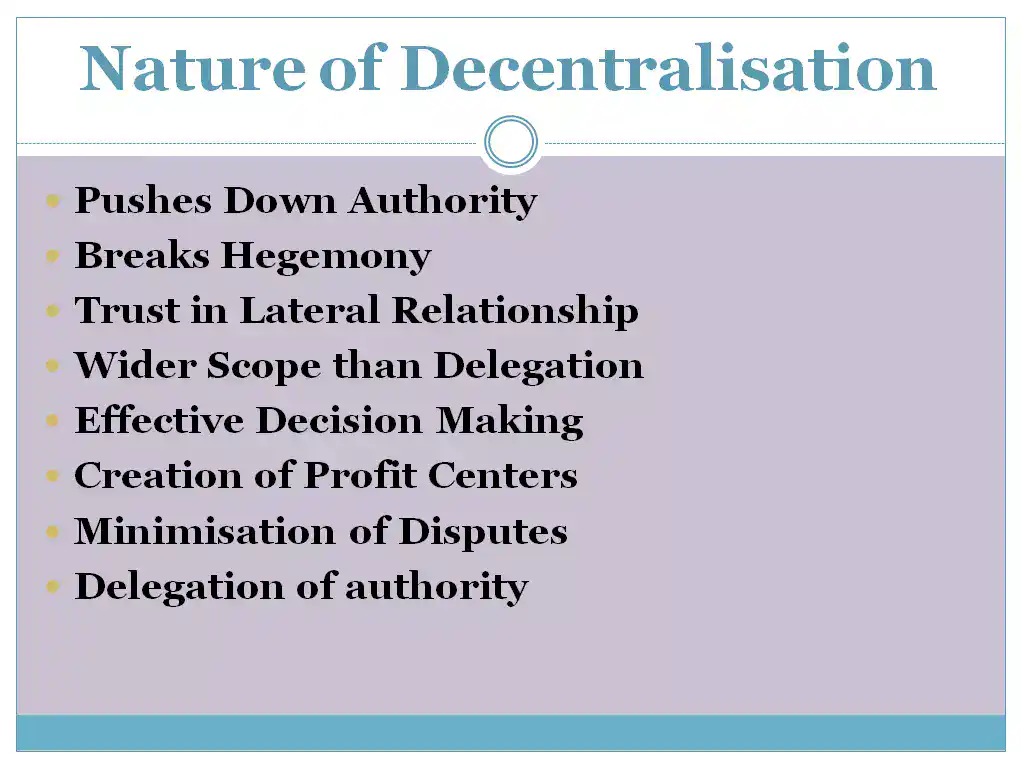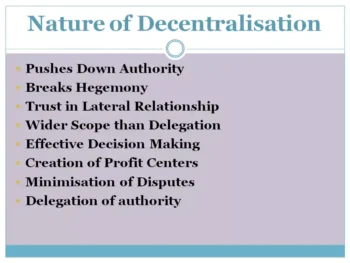Table of Contents:-
- Centralisation and Decentralisation
- Centralisation Meaning
- Decentralisation Meaning
- Nature of Decentralisation
Centralisation and Decentralisation
Centralisation and decentralisation represent two contrasting approaches to organizing and distributing power within an organization or system. These concepts significantly influence the structure, consumer decision making process, and overall effectiveness of an entity.
Centralisation Meaning
Centralisation refers to the systematic reservation of authority at central points within the organisation. It implies that most decisions regarding the work are made not by those doing the work but by a higher point in the organisation. Centralisation means retention or concentration of managerial authority in a relatively few key executive positions at the nerve centre of an organisation, viz., at the top level. In short, everything that goes to reduce the subordinate’s role in decision making is centralisation.
Decentralisation Meaning
Decentralisation of authority means a conscious/systematic effort to bring dispersal (spreading) of decision making power to the lower levels of the organisation. In decentralisation, only broad powers will be reserved at the highest level. Such powers include power to plan, organise, direct and control and maximum powers will be delegated to the authority at the lower level.
Decentralisation is just opposite to centralisation. Under centralisation, authority is mostly concentrated at the top levels of management. Centralisation and decentralisation are mutually dependent. In a large organization, centralization and decentralization processes coexist and mutually reinforce each other.
Decentralisation is a natural development when the organisation grows large and complex. In this context, centralizing management is neither achievable nor desirable. The only practical solution is to divide the organisation into decision-making units and give the powers to make routine types of decisions in regard to the functioning of those units. This is decentralisation in practice. In decentralisation, systematic efforts are being made to delegate authority to the lowest levels, except for tasks which can only be exercised at the central points.
Decentralization is not just delegation from one person to another; it’s about delegating to all units within an organization. A company is said to be highly decentralised when the delegation is company-wide in all functions and divisions of the company and also for a wide range of authorities and responsibilities.
According to Louis A. Allen, “Decentralisation refers to the systematic effort to delegate to the lowest levels all authority except that which can only be exercised at central points”.
According to Henry Fayol, “Everything that goes to increase the importance of the subordinate’s role is decentralisation; everything that goes to reduce it is centralisation”.
Nature of Decentralisation
The nature of decentralisation is as follows:
1) Pushes Down Authority: Decentralisation involves pushing down decision making authority near the place of action. Therefore, decentralisation is an extension of delegation of authority.
2) Breaks Hegemony: Decentralisation breaks the prevailing hegemony and frustrating bureaucratic ways of doing things by involving a cross-section of employees in deciding the relevant course of action for the organisation.
3) Trust in Lateral Relationship: A decentralised organisation relies more on lateral relationships and less on command or force.
4) Wider Scope than Delegation: Decentralisation of authority is not restricted to two individuals. It involves systematic delegation of authority at all levels and functions within the organization. In the case of decentralisation, managers at the middle and lower levels are granted the authority to make decisions on tasks assigned to them. Therefore, the scope of decentralisation is broader than delegation.
5) Effective Decision Making: There is an increased bottom-to-top flow of ideas and communication for participatory decision making.
6) Creation of Profit Centres: It enables the creation of profit centres or divisions by dividing the organisation based on product categories. Each division is assigned the required management and physical tools and facilities to operate as an integrated and self-contained unit. Each division operates independently and competes on its own. It is responsible for the profit or loss resulting from its operations.
7) Minimisation of Disputes: Coordination of the work of the various agencies in the field should be made in the field itself because; central coordination means delays, jealousies and jurisdictional disputes.
8) Delegation of authority: In a relatively more decentralised organisation, the top executives delegate some of their decision making authority to the lower tiers of the organisational structure.

Related Articles:
